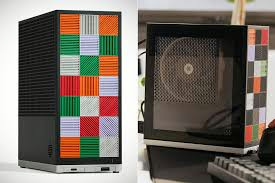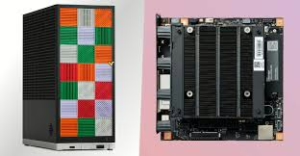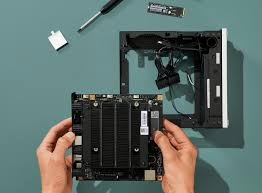In a surprising twist for technology enthusiasts, Framework, a company predominantly recognised for its innovative modular and easily repairable laptops, has ventured into new territory with the launch of its inaugural desktop computer. This compact desktop PC is more than meets the eye, delivering a performance that belies its small stature.

At the heart of this intriguing device lies a groundbreaking innovation. The framework is among the pioneering companies to incorporate AMD’s newly unveiled Strix Halo architecture, also called the Ryzen AI Max processors. This cutting-edge processing unit is engineered to deliver impressive performance, promising a significant boost in computational power.
With this release, Framework has effectively crafted a desktop computer tailored for two distinct groups of users: those in search of an ultra-compact gaming rig and individuals keen on deploying large language models directly on their machines.
Visually, the Framework Desktop presents a playful aesthetic that might lead one to mistake it for a toy rather than a formidable computing machine. Its diminutive size—measuring just 4.5 litres—houses a mini-ITX motherboard, making it notably smaller than popular gaming consoles like the PlayStation 5 or the Xbox Series X.

One of the standout features of this desktop is its customisable front panel, which boasts 21 interchangeable plastic square tiles. When you purchase a Framework Desktop from the company’s online store, you can personalise your device by choosing from a variety of colours and patterns, allowing you to create a front panel that truly reflects your style.
Furthermore, the desktop comes equipped with the standard array of ports typically found on a mini-ITX motherboard. However, it also includes Framework’s signature expansion cards located at both the front and back of the unit—two at each end. Users can choose from an extensive selection of modules to enhance connectivity options, including USB-C and USB-A ports, a headphone jack, an SD card reader, or even additional storage expansion cards.

In essence, Framework has blended functionality with personalisation in a compact package, setting a new benchmark for what a desktop computer can be.
At the heart of the Framework Desktop lies a surprisingly straightforward assembly: a mainboard featuring AMD’s advanced accelerated processing unit, accompanied by a fan, a heat sink, a power supply, and two M.2 2280 NVMe SSD slots for storage needs. The Strix Halo APU from AMD is firmly soldered onto the mainboard, ensuring stability and performance. The framework presents users with two distinct configurations to choose from: the AMD Ryzen AI Max 385 and the more powerful AMD Ryzen AI Max+ 395. The higher-end model boasts an impressive 16 CPU cores, 40 graphics cores, and a substantial 80MB cache, while the entry-level version offers a respectable 8 CPU cores, 32 graphics cores, and 40MB of cache.
However, the absence of upgradeable RAM is likely to spark some debate among potential buyers. Framework has opted to provide soldered RAM options ranging from 32GB to a staggering 128 GB. Once you’ve made your choice, there won’t be an opportunity to enhance or expand your memory in the future.

As Framework CEO Nirav Patel shared in a blog post, “We had to diverge from traditional PC practices regarding memory. To achieve the remarkable 256GB/s memory bandwidth that Ryzen AI Max provides, we decided to solder the LPDDR5x directly.” He elaborated that extensive collaboration with AMD was undertaken to find a solution that would allow for modular memory while maintaining high throughput on a 256-bit memory bus, but ultimately, they found it unfeasible.
On the bright side, having up to 128GB of unified memory opens up a wealth of possibilities for working with large language models. For example, Llama 3.3 70B operates seamlessly when paired with tools like Ollama, llama.cpp, and other open-source applications designed for local AI tasks. Similarly, various open-weight models from Mistral, Nous, Hermes, or DeepSeek are expected to perform admirably.

In addition to its desktop offerings, Framework provides an option to purchase the mainboard separately, without any casing. This flexibility has led to some creative setups; one notable example is a mini-rack constructed by the company that houses four Framework Desktop mainboards operating concurrently for AI experimentation.
Pricing: The Framework Desktop’s base model starts at $1,099, while the premium configuration can reach as high as $1,999. True to its commitment to versatility, Framework assures customers that their systems will support not only Windows but also popular Linux distributions like Ubuntu, Fedora, and the gaming-oriented Bazzite.
In this innovative landscape where technology meets user demand, Framework is carving out a niche that embraces both simplicity and performance, allowing users to explore the expansive realm of AI with confidence and creativity.

Maxthon: Your Reliable Ally in the Online Universe
In a time when the internet is deeply embedded in the fabric of our daily existence, protecting our digital identities has never been more essential. Picture embarking on a thrilling journey through the vast and mostly uncharted landscapes of the web, where every click reveals a hidden trove of knowledge and enchanting experiences. However, within this expansive digital expanse, lurking dangers threaten to compromise personal information and overall security. To navigate this intricate online terrain with assurance, it is crucial to select a browser that prioritises user safety. This is where Maxthon Browser emerges as a steadfast ally on your expedition—and the best part? It comes at no cost.
Maxthon Browser: A Top Pick for Windows 11 Enthusiasts
What sets Maxthon apart from standard web browsers is its unwavering dedication to safeguarding online privacy. Imagine it as a watchful protector, constantly vigilant against the myriad threats that inhabit the digital wilderness. Equipped with an impressive array of built-in tools—including ad-blockers and anti-tracking technologies—Maxthon actively defends users’ online personas. As individuals surf the internet on their Windows 11 devices, these protective features create a formidable barrier against intrusive advertisements and prevent websites from tracking their browsing habits.

The Perfect Harmony Between Maxthon and Windows 11
As users navigate the lively digital landscape on a Windows 11 device, the importance of Maxthon’s commitment to privacy becomes increasingly apparent. Advanced encryption methods ensure that sensitive information remains secure during online adventures. Thus, as users delve into the unexplored territories of cyberspace, they can embark on their digital journeys with assurance, knowing their data is safeguarded from prying eyes.
